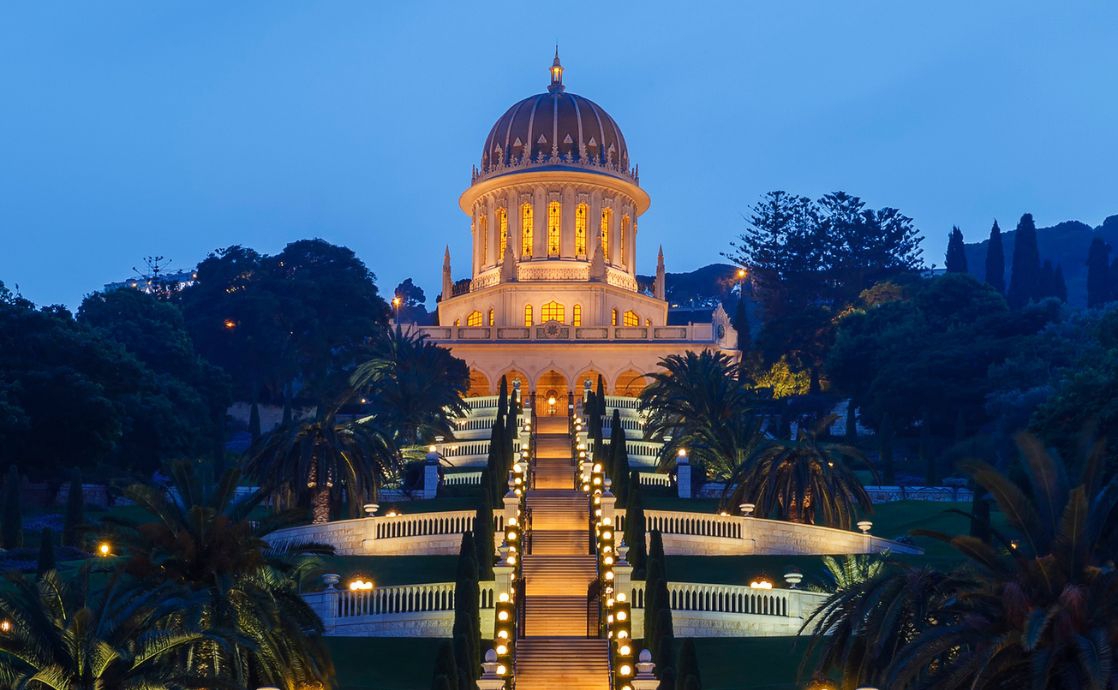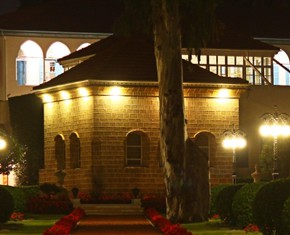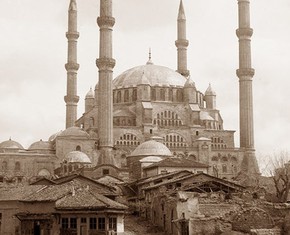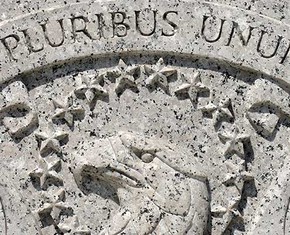The views expressed in our content reflect individual perspectives and do not represent the authoritative views of the Baha'i Faith.
How did the Baha’i Faith begin? In 19th century Persia, the Baha’i Faith emerged with the advent of two successive prophets, the Bab and Baha’u’llah. Their combined revelations revolutionized the world.
Each of these two divine messengers, who the Baha’i teachings refer to as manifestations of God, founded a distinct religion – the Babi and the Baha’i Faiths. The Bab, however, said that the primary purpose of his new Faith was to prepare the way for “Him Whom God shall make manifest” – to act as a herald and forerunner of the second of these twin manifestations, Baha’u’llah.
In much the same way that John the Baptist preceded and paved the way for the advent of Jesus Christ, the Bab created the spiritual conditions necessary for Baha’u’llah’s advent.
Abdu’l-Baha, the son and successor of Baha’u’llah, explained that dual revelation in the book “Some Answered Questions:”
All the peoples of the world are awaiting two Manifestations, Who must be contemporaneous. This is what they all have been promised. In the Torah, the Jews are promised the Lord of Hosts and the Messiah. In the Gospel, the return of Christ and Elijah is foretold. In the religion of Muhammad, there is the promise of the Mahdi and the Messiah. The same holds true of Zoroastrians and others, but to belabour this matter would prolong our discourse. Our meaning is that all have been promised the advent of two successive Manifestations. It has been prophesied that, through these twin Manifestations, the earth will become another earth; all existence will be renewed; the contingent world will be clothed with the robe of new life; justice and righteousness will encompass the globe; hatred and enmity will disappear; whatever is the cause of division among peoples, races, and nations will be obliterated; and that which ensures unity, harmony, and concord will be promoted.
New religions begin when a prophet of God receives a revelation, a mystical transference of inspiration, knowledge and spiritual power from the Creator. Then a few visionary early disciples begin to respond with their hearts and souls, and a new religion is born. With Buddha, with Abraham, with Jesus, with Muhammad, this same basic pattern applied.
The Baha’i Faith’s precursor the Babi Faith began that way, too, but with one difference – we have an eyewitness account.
RELATED: So What Did the Bab Teach?
When the Bab (pronounced bŏb), the young herald of the Baha’i Faith, declared his mission to the first of his believers during the fateful evening of May 22, 1844, the world’s newest global Faith began. Baha’is all around the world believe that the Bab, a title which means the Gate, ushered in a new era destined to establish the unity of humanity, in which “the cause of division among peoples, races, and nations will be obliterated.”
Who was the Bab? A young man named Siyyid Ali Muhammad, from Shiraz, Persia, born in 1819 into a family of merchants and traders, raised by his maternal uncle after the premature death of his father in 1826, a mystic descended from many generations of mystical Sufis, known from childhood for his wisdom, intelligence and humility, The Bab’s teachings would spark a revolutionary religious movement unparalleled in history.
On this day in May of 1844, Siyyid Ali Muhammad declared his mission as the Bab to an ardent spiritual seeker named Mulla Husayn. Younger than Jesus when he inaugurated his revelation, the Bab established, at two hours and 11 minutes after sunset on that day, an entirely new faith, renewing the eternal promise of religion itself. The Bab promised Mulla Husayn that:
This night, this very hour will, in the days to come, be celebrated as one of the greatest and most significant of all festivals. Render thanks to God for having graciously assisted you to attain your heart’s desire, and for having quaffed from the sealed wine of His utterance.
Like a spiritual wildfire, the news spread quickly. The Bab’s magnetic appeal, based not only on his new principles and writings, but also on the kindness, compassion, and spiritual intensity he radiated, won over many thousands of people. Those people became Babis, creating an uproar in traditional Persian Islamic society and among its Shiite power structure.
The Bab’s teachings challenged the corrupt practices of the Persian clergy, boldly defied tradition by doing away with the laws of the past, and declared that The Bab had come, like John the Baptist, as the herald for a subsequent prophet of God, the promised one that all religions awaited. The Bab’s mission, he told his followers, was to prepare the way for the founder of a universal and unifying world religion – Baha’u’llah, the prophet and founder of the Baha’i Faith, who would declare his mission nineteen years later in 1863.
So every year in May millions of Baha’is around the world celebrate the Declaration of the Bab – which has become, exactly as the Bab promised, “one of the greatest and most significant of all festivals.”
Related: Why Do We Kill Our Prophets? The Martyrdom of the Bab
In his book “God Passes By,” a brief history of the Babi movement, Shoghi Effendi, the Guardian of the Baha’i Faith, recounts that exact moment which Baha’is now celebrate:
The opening scene of the initial act of this great drama was laid in the upper chamber of the modest residence of the son of a mercer of Shiraz, in an obscure corner of that city. The time was the hour before sunset, on the 22nd day of May, 1844. The participants were the Bab, a twenty-five year old siyyid, of pure and holy lineage, and the young Mulla Husayn, the first to believe in Him. Their meeting immediately before that interview seemed to be purely fortuitous. The interview itself was protracted till the hour of dawn …. No record has passed to posterity of that unique night save the fragmentary but highly illuminating account that fell from the lips of Mulla Husayn.
“I sat spellbound by His utterance, oblivious of time and of those who awaited me,” he himself has testified, after describing the nature of the questions he had put to his Host and the conclusive replies he had received from Him, replies which had established beyond the shadow of a doubt the validity of His claim to be the promised Qa’im. “Suddenly the call of the Mu’adhdhin, summoning the faithful to their morning prayer, awakened me from the state of ecstasy into which I seemed to have fallen. All the delights, all the ineffable glories, which the Almighty has recounted in His Book as the priceless possessions of the people of Paradise – these I seemed to be experiencing that night. Methinks I was in a place of which it could be truly said: ’Therein no toil shall reach us, and therein no weariness shall touch us;’ ’no vain discourse shall they hear therein, nor any falsehood, but only the cry, “Peace! Peace!”’; ’their cry therein shall be, “Glory to Thee, O God!” and their salutation therein, “Peace!”, and the close of their cry, “Praise be to God, Lord of all creatures!””
“This Revelation,” Mulla Husayn has further testified, “so suddenly and impetuously thrust upon me, came as a thunderbolt which, for a time, seemed to have benumbed my faculties. I was blinded by its dazzling splendor and overwhelmed by its crushing force. Excitement, joy, awe, and wonder stirred the depths of my soul.
Today, just as Mulla Husayn, the first follower of the Bab did on that day, Baha’is rejoice and celebrate every year on the anniversary of the Bab’s momentous declaration, when he first sounded the great call for the unity of all peoples, races, nations and Faiths.
















Comments
Sign in or create an account
Continue with Googleor